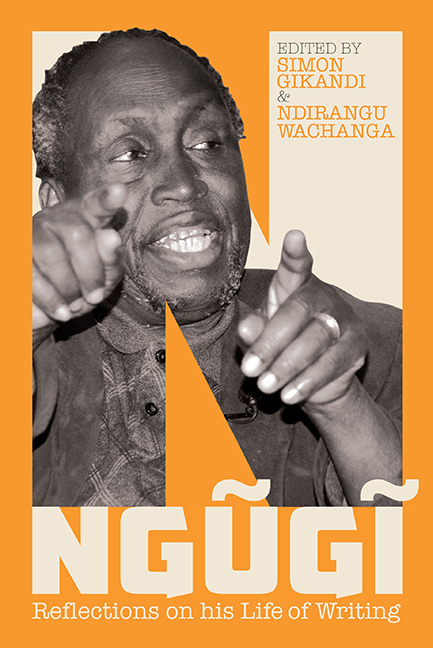Book contents
- Frontmatter
- Contents
- Preface
- Acknowledgements
- Chronology
- Photographic Section
- Introduction: Ngũgĩ wa Thiong'o: Reflections on His Life of Writing
- Ngũgĩ at Work
- Part I Serenades & Beginnings
- Part II Memories, Recollections & Tributes
- Part III Working with Ngũgĩ
- Part IV The Writer, the Critic & the World
- 23 Bricklayer & Architect of a World to Come
- 24 Revisioning Goethe's Idea of ‘World Literature’ [Commendation Address On the Awarding of the Dr. Phil. h.c. (Honorary Doctor of Letters) to Ngũgĩ wa Thiong'o, University of Bayreuth, Germany, April 2014]
- 25 Globalectics: Beyond Postcoloniality, & Engaging the Caribbean
- 26 Ngũgĩ & the Quest for a Linguistic Paradigm Shift: Some Reflections
- 27 Autobiographical Prototypes in Ngũgĩ wa Thiong'o's Early Fiction & Drama
- 28 Homecoming: The Idea of Return in the Works of Ngũgĩ wa Thiong'o
- 29 Gũcookia Rũĩ Mũkaro
- 30 Muthoni's Afterlives
- Part V The Other Ngũgĩ
- Appendixes
- References
- Bibliography of Ngũgĩ's Primary Works
- Works Cited
- Notes on Contributors
- Index
23 - Bricklayer & Architect of a World to Come
from Part IV - The Writer, the Critic & the World
Published online by Cambridge University Press: 27 July 2019
- Frontmatter
- Contents
- Preface
- Acknowledgements
- Chronology
- Photographic Section
- Introduction: Ngũgĩ wa Thiong'o: Reflections on His Life of Writing
- Ngũgĩ at Work
- Part I Serenades & Beginnings
- Part II Memories, Recollections & Tributes
- Part III Working with Ngũgĩ
- Part IV The Writer, the Critic & the World
- 23 Bricklayer & Architect of a World to Come
- 24 Revisioning Goethe's Idea of ‘World Literature’ [Commendation Address On the Awarding of the Dr. Phil. h.c. (Honorary Doctor of Letters) to Ngũgĩ wa Thiong'o, University of Bayreuth, Germany, April 2014]
- 25 Globalectics: Beyond Postcoloniality, & Engaging the Caribbean
- 26 Ngũgĩ & the Quest for a Linguistic Paradigm Shift: Some Reflections
- 27 Autobiographical Prototypes in Ngũgĩ wa Thiong'o's Early Fiction & Drama
- 28 Homecoming: The Idea of Return in the Works of Ngũgĩ wa Thiong'o
- 29 Gũcookia Rũĩ Mũkaro
- 30 Muthoni's Afterlives
- Part V The Other Ngũgĩ
- Appendixes
- References
- Bibliography of Ngũgĩ's Primary Works
- Works Cited
- Notes on Contributors
- Index
Summary
‘The patience of the bricklayer/ is assumed in the dream of the architect’, Gael Turnbull has written (in Owens ‘Gael Turnbull: The Bricklayer Reconsidered’). In the all-important project of building Kenya into our imagination, Ngũgĩ has worked as both the bricklayer and the architect. Plunging in the early years of his career into history, he has cleared the ground of colonial and neo-colonial narrative falsehoods, of chaotic, narrow and superficial representations of Kenya, and carefully, brick by brick, he has imagined a Kenya whose past was an unbroken chain of resistance to conquest and oppression, and in which the agents of every creative endeavor were the common people. Turning later to the post-colonial present, he has peeled the camouflaging tarpaulin spread over the body of the nation and exposed the ‘petals of blood’ feeding on its flesh. His pathos of rejection has only been equaled by his pathos of analysis as he strived to ‘suggest a future’ – a Kenya free of the all-consuming greed of a powerful minority in which the principle of humanity triumphs. This architectural dream of a world to come constitutes the most sacred aspiration of the Kenyan people and nurtures their indomitable spirit.
Ngũgĩ's concern, however, has been not only with Kenya, but with Africa as a whole. Re-membering Africa (also published as Something Torn and New), in particular, is dedicated to this other project – the transformation of Africa from a repeatedly dismembered, torn apart plaything, into a complete being with a limitless capacity for re-generation and growth. Ngũgĩ is inspired by the idea of making the twenty-first century a century of genuine re-birth for Africa, its peoples and their cultures. The depth of this idea and the hope that permeates it turn his essays into significant interventionist strategies.
The African experience, because of slavery and colonization, has been fraught with notions of fragmented histories and cultures. Colonial inscriptions and skewed knowledge production on and of Africa have arrested the development of the continent on many fronts. The Empire also made deliberate attempts to either erase or deny the African and other colonized peoples’ history altogether.
- Type
- Chapter
- Information
- NgugiReflections on his Life of Writing, pp. 133 - 134Publisher: Boydell & BrewerPrint publication year: 2018

